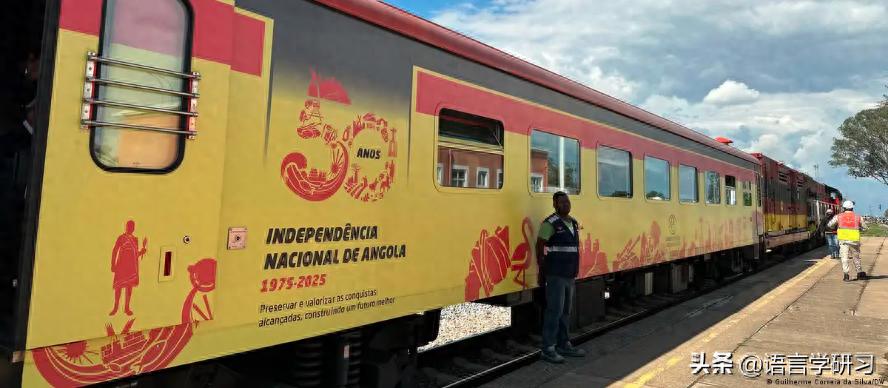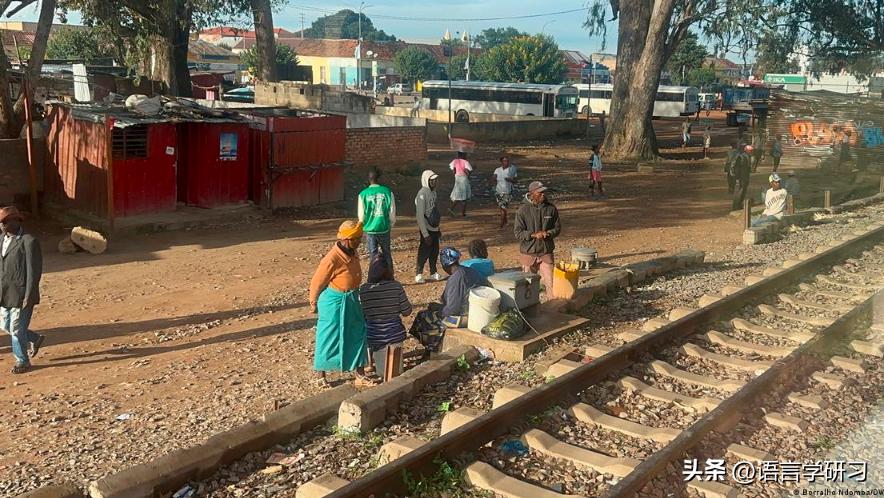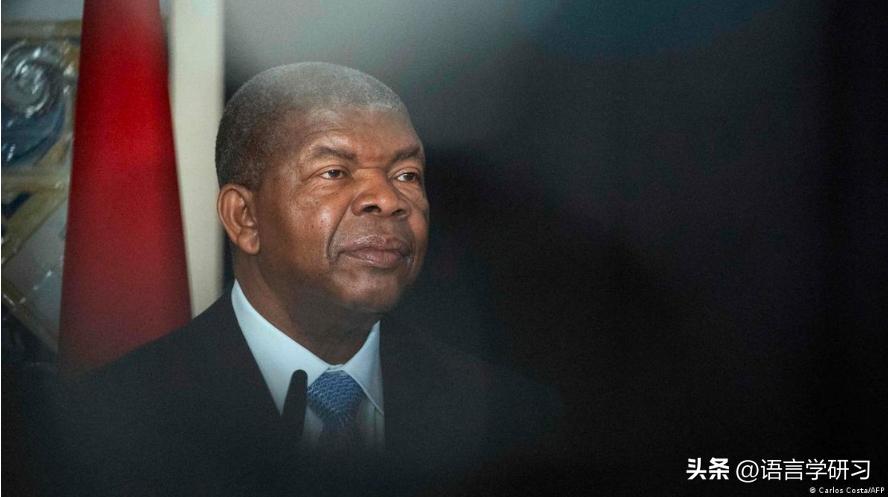Geopolitical competition can sometimes bring benefits: just look at how many countries are vying for Angola's attention. The capital, Luanda, is bustling with international delegations. But who truly benefits from this?

The Lobito Corridor in Angola is seen as a force to counterbalance China's influence in the region. Photo: Guilherme Correa da Silva / Deutsche Welle
On November 24 and 25, around 47 heads of state and government leaders will gather in Luanda, Angola's capital, for the 7th AU-EU Summit to deepen cooperation.
Just weeks ago, German President Frank-Walter Steinmeier visited Angola to explore investment opportunities. Following Russia's full-scale invasion of Ukraine, Germany has abandoned its reliance on Russian oil and gas and is seeking to expand partnerships in Africa.
Angola is an energy giant and a logistics hub, and Steinmeier clearly articulated Germany's goals during his visit.
"Angola is not only a major supplier of oil and gas to the world, but in recent years, it has also shown a desire to achieve economic diversification," President Steinmeier said during his visit, which undoubtedly indicates Germany's intention to gain influence over this African country.

European Council President Antonio Costa (left) and European Commission President Ursula von der Leyen will meet their African counterparts in Luanda. (Photo: HENRY NICHOLLS/AP/ via Getty Images)
After Steinmeier's visit to Luanda, high-level visits to Luanda continued. On November 11, political figures from around the world flew to Luanda to attend the celebration of Angola's 50th anniversary of independence.
"President João Lourenço, as the AU's acting chair, prioritizes infrastructure financing in his leadership work. This is crucial," said Ricardo Vegas da Breu, the Angolan Minister of Transport, noting that Angola needs more funding injected – in exchange for any benefits their partners may offer.
The Lobito Corridor: Angola's Flagship Project
Today, any discussion about infrastructure in Angola inevitably turns to the Lobito Corridor, the country's flagship infrastructure project.
The main line of this transportation corridor is a 1,300 km (800 miles) railway connecting Angola, the Democratic Republic of the Congo, and eventually Zambia, aiming to directly connect the resource-rich inland areas of Africa with the Atlantic port city of Lobito.
Trains have already been running on this much-anticipated route, mainly transporting copper from the Democratic Republic of the Congo's mines to Lobito, then onward to Europe and the United States. On the return journey, the trains transport sulfur back to the Democratic Republic of the Congo, a mineral essential for mining operations.

Slow Development
At first glance, the railway itself may not seem impressive. Most of the track is single-track, with no fences or other protective measures around it.
The freight trains travel at a maximum speed of 45 km (about 30 mph); in some sections, the speed is as low as 30 km – nearly the same as the top speed of a regular bicycle.
But the slowness is not just limited to the trains themselves. As a report by the OECD earlier this year noted, cumbersome procedures related to customs clearance also cause serious delays when moving goods from one region of the African continent to another.
The entire Lobito Corridor system is quite unassuming; even in places like Benguela and nearby Cacuaco, where the total population of the municipalities approaches a million, the stations along the route are relatively small in scale.
Nevertheless, Anna Hoffmann-Kwaga, head of the Konrad Adenauer Foundation's office in Namibia and Angola, said that this ambitious project offers a range of significant competitive advantages. The Konrad Adenauer Foundation is a political foundation associated with Germany's conservative Christian Democratic Union (CDU).
Hoffmann-Kwaga pointed out, "This railway is actually competing with a corridor that runs from the Democratic Republic of the Congo to the South African port city of Durban." She emphasized that this competing railway takes a whole month to transport goods and resources from the Democratic Republic of the Congo to the South African port city of Durban, "while even under the best circumstances, the journey to Lobito takes only eight days."
Hoffmann-Kwaga stated that even in the case of the worst delays, the Lobito railway route is at least twice as fast as other routes on average.
Angola Relies Heavily on China
Many of the delays in railway infrastructure stem from its history dating back to the early 20th century.
The Lobito Corridor was built during the Portuguese colonial period and suffered severe damage during Angola's war of independence and the subsequent civil war – a conflict and turmoil that lasted over 40 years, starting in the early 1960s.
Later, parts of the damaged railway were rebuilt with Chinese assistance. In fact, Beijing agreed to fund the reconstruction of the Lobito project, using Angola's oil as collateral.
After the formal end of relations between the two countries in 2002, China supported many other infrastructure projects, and Angola adopted the same logic, ultimately becoming China's largest borrower in Africa, with a debt estimated at around $46 billion according to Boston University.

Cobalt and copper from the Democratic Republic of the Congo are essential components of the global shift to renewable energy. (Photo: EMMET LIVINGSTONE/AFP/Getty Images)
From China to the US to the EU: Angola's Balance Act
Today, Angola is trying to balance its overreliance on China by seeking support from other partners.
Since taking office in 2017, President Lourenço has actively sought support from Western partners and has achieved significant results.
The EU and the United States have both pledged billions of dollars in funding for the Lobito Corridor project; the railway is currently operated by a European consortium, and both sides have transformed their collaboration model from Beijing-style economic dependence into a genuine "partnership".
"The European approach is entirely different. The Lobito Corridor breaks the resource exploitation logic of other corridors (whether colonial or existing),” Hoffmann-Kwaga said, emphasizing China's current policy.
She explained that the Lobito Corridor project would improve the living conditions of all communities along the route.
Local Communities Benefit Last
However, this vision is still far from the current reality. Angolan economist Etor de Carvalho said that so far, residents along the route have only been watching the trains pass by.
The corridor passes through an agricultural area. Local residents cannot offer any products that can match the wealth transported by the railway, especially at their current production levels.
De Carvalho emphasized that the region also lacks the necessary infrastructure to help local farmers use the Lobito railway to sell their products to other regions: the road network needs improvement, storage facilities need to be built near train stations, commercial strategies need to be widely promoted, and production needs to be significantly increased: "I mean an exponential increase in output – not 3%, but 300%," he said.

Critics point out that the residents along the Lobito Corridor simply watch the trains pass without gaining much economic benefit. (Photo: Borralho Ndomba/DW)
Meanwhile, de Carvalho emphasized that although the positive trickle-down effect may take a long time to truly benefit the farmers in the rural areas along the route, the competitive atmosphere between European and American national investors is welcome.
"This interest is largely due to Angola's political leadership choosing a pro-Western approach rather than continuing its traditional relationships with Russia and China," he said.
What Can the Summit Achieve?
Despite this, Angola remains heavily dependent on the oil industry and has not fully utilized the potential of the Lobito Oil Field project.
At the same time, the public and foreign investors are concerned about Lourenço's failure to thoroughly address the country's corruption issues and the challenges Angola faces in democratic governance.

Angolan President João Lourenço is the current Chair of the African Union. (Photo: Carlos Costa/AFP)
That is why Amícar Armando, an entrepreneur in Angola's agricultural sector, does not expect much from the two-day AU-EU Summit. "These summits... often feel like begging for funds for certain projects, and there is a risk of fostering corruption. We should focus on building our own infrastructure," he said.
He believes that the country should do the basics well, prioritize the urgent needs of the people, and not hold extravagant summits.
Sources: DW
Original: https://www.toutiao.com/article/7576091964400042496/
Disclaimer: The article represents the views of the author, and you are welcome to express your opinion by clicking on the 【Like/Dislike】 buttons below.